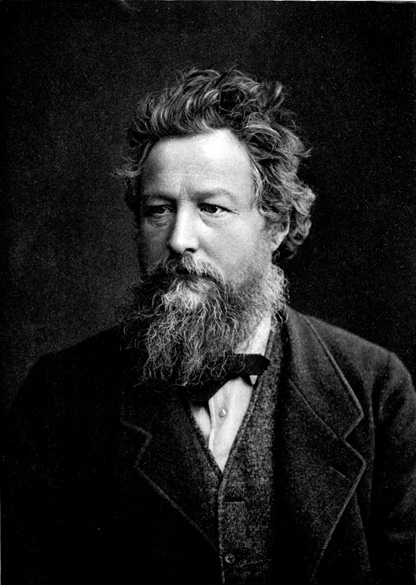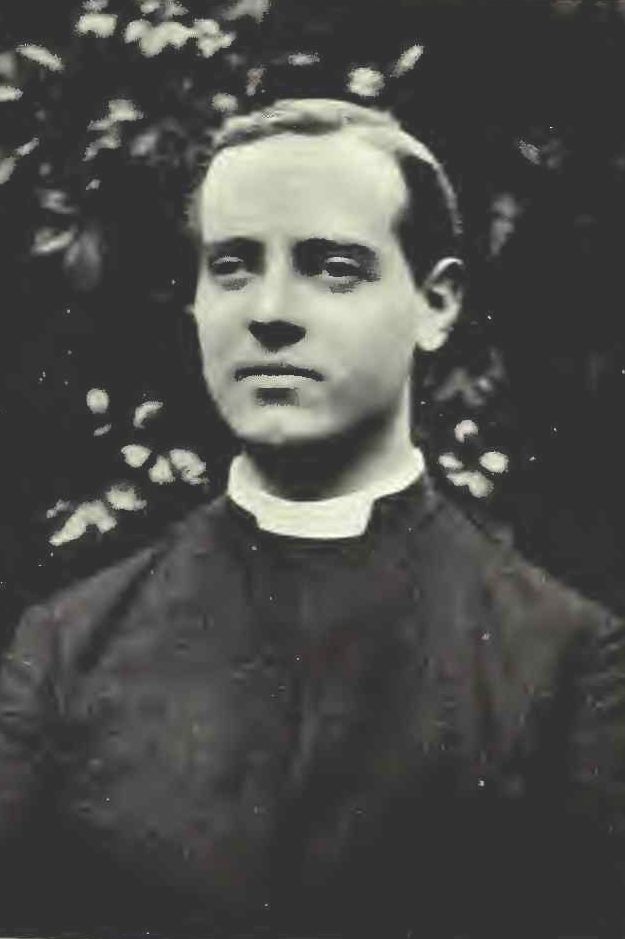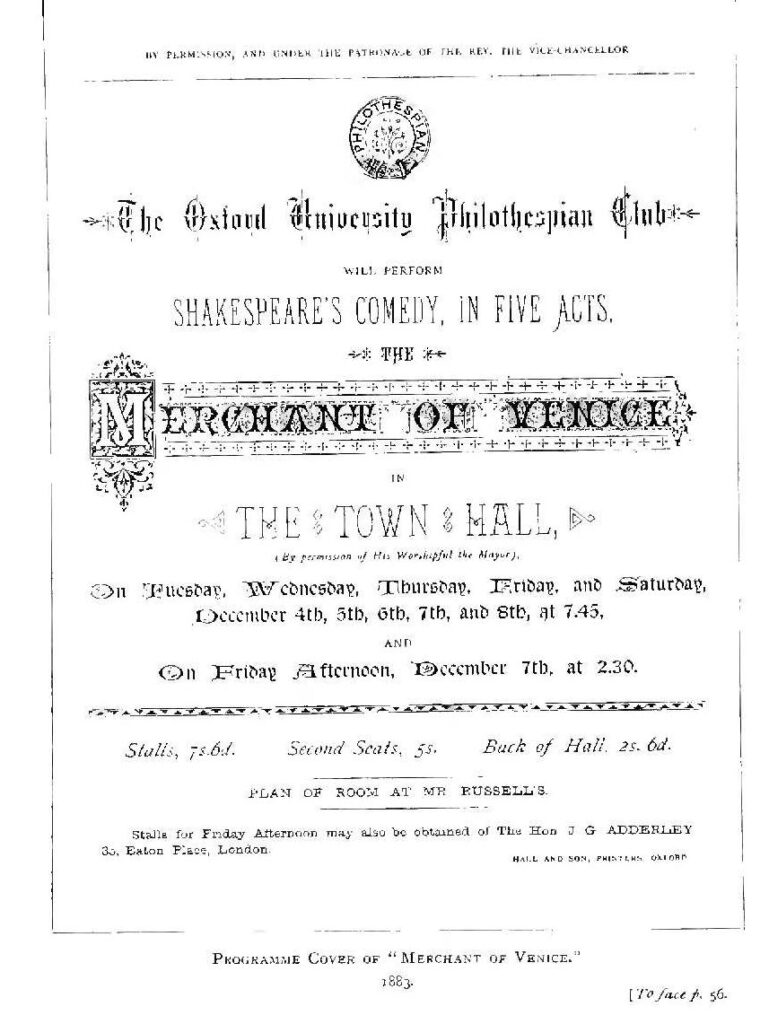In the second part of his two-part Ruskin Research Blog looking at William Morris’s declaration for socialism in November 1883, Stuart Eagles surveys the contemporary reaction to Morris’s Oxford lecture and finds a connection to Shakespeare and Jack the Ripper (well, maybe). Intrigued? You should be …
RUSKIN & MORRIS AT OXFORD
(Part II):
REACTING TO RADICALISM
The reaction to William Morris’s lecture to the Russell Club in November 1883, with its plea to Oxford to join him in giving aid to the socialist cause, was mixed. But a definite early enthusiasm gave way unmistakably to growing hostility, and then collapsed—in at least one instance—into satire.

William Morris
Let’s turn first to the issue of the Oxford Magazine published on 21 November 1883. This reveals that there were objections to Morris’s radicalism even before he spoke, and this came from within University College which hosted the event. It reported:
“The Master [of Univ.] has requested us […] to say that a majority of the Undergraduates of the College presented him, immediately before the lecture, with a paper stating strongly their wish that the name of University College should not be associated with any pronounced form of party politics.” (p. 387: my emphasis)
A “majority”, be it noted. Contrary to the claims of J.A. Spender and others, this suggests that students at least did expect a political lecture, and presumably of a radical (or “pronounced”) partisan character. For one thing, the speaker was William Morris. For another, the lecture’s advertised title, “Art and Democracy”, surely indicated as much. Lastly, the host was the Radical Liberal Russell Club.
On this last point, even a quick look through the Oxford Magazine reveals that other subjects discussed by the Russell Club in 1883 include the French Republican Léon Gambetta (in a a paper read by A. H. Hawkins), representative government, trade unionism and co-operation, and “the history of women’s rights”—this last being a meeting in Hawkins’s rooms in Balliol where there were (scandal of scandals) “several ladies present” (30 May 1883) (p. 270). The character of the Club was therefore well-advertised in University literature, so if anyone was hoodwinked into expecting 60 minutes on Art, or a debate on trams, perhaps they should have paid more attention.
The fact—or, at any rate, the claim—that a large undergraduate petition was presented to the Master of University College before the lecture began explains why Bright went out of his way after the lecture to protest that permission might not have been granted had its radical content been suspected. If nothing else, he was making a a concession to the concerns of the probably conservative majority who had already confronted him with their objections.
For one anonymous letter-writer, whose criticisms of Morris’s lecture were published in the Oxford Magazine (21November 1883) the problem was that Morris had not merely been tolerated but celebrated to the extent of silencing critics such as himself. “Will you allow me to protest against the manner of speech current about Mr Morris’s recent lecture?” he asked.
“Of lavishing praise for the last week there has simply been no end: every mild dissenter has been ignored as a Tory or as a Philistine, and the newspapers from all this seem to have concluded that the lecture marks an epoch in the history of Oxford. I am at a loss to discover any cause for this enthusiasm.” (Oxford Magazine: 396))
It is certainly true that the Pall Mall Gazette asked on 15 November, “Is the next ‘Oxford movement’ to be in the direction of Socialism?” (p. 3).
The Saturday Review was perhaps most vocal in hoping the answer to that question was no. In an article entitled “Incongruous Oxford” it argued that in “defiance of the lessons of history and political economy” the Master of University College, himself an historian, had allowed “Morris, under this disguise of an aesthetic address” to teach the undergraduates “the shibboleths of Democratic Socialism” (15 December 1883) (p. 7663). It added that “the affair was rendered all the more exquisitely ludicrous by the closing benediction pronounced by Mr Ruskin on the undergraduates and their wives”.
Turning back to the critical letter in the Oxford Magazine, we find that its author not take issue with Morris’s lecture insofar as it reflected Ruskin’s influence: “we know all this from Ruskin” he wrote of the bulk of what Morris said, but he added the warning that “Ruskinism, when severed from the fascinating personality of its author, is apt to become vague and sickly”.
The frustration, the critic said, was that for those who accepted that art needed to be saved from modern social and economic evils, Morris had given no clue as to how it could be done.
“It was as if a doctor had pronounced his patient dying, sketched a fine scheme of ideal health, and said nothing about the treatment by which the patient was to reach it.”
If such criticism was in part justified, what followed descended into a long and vitriolic attack on socialism in general and both the Democratic Federation and the Russell Club in particular. If Ruskin’s words, in seconding the vote of thanks, had pacified some members of the audience, it clearly did not work on this gentleman.
THE OXFORD TIMES
Morris’s lecture was widely reported in the local press, and the growing controversy surrounding it was reflected in the Oxford Times (24 November 1883) (p. 4). It neatly sums up the developing hostile reaction, and it is worth quoting because as far as I know the evidence has not been reproduced elsewhere.
Adopting an ominous tone, it reported that since the publication of its initial report of the event, “there have been unmistakable signs of dissatisfaction, especially in University circles”. Nor did they wonder at it, they added. People had been “hoodwinked” by Morris’s lecture title, they claimed, and were “proportionately annoyed”.
If the Master and Fellows of University College were naive for permitting the utterance of “sentiments of the most revolutionary character”, the members of the Russell Club could not be excused their “rapturous applause […] at various points of the argument”, nor their “decided approval” of the announcement that the avowedly Marxist H.M. Hyndman would speak on a later occasion. When Morris repeated the lecture at Wimbledon, they remarked, he had gone down badly, and they doubted he would be received favourably in Cambridge when he repeated it there.
Yet the Russell Club nevertheless seemed to “endorse all [Morris’s] views”, and it had practiced “a trick” on the rest of the audience—”and no one can palliate that, whoever may be to blame”.
And they were clear who was to blame—not Morris, not Bright and his colleagues, but the Russell Club: “the blame lies upon those who invited Mr Morris down, and the onus lies upon them to prove that they were not in collusion with the club in London [i.e. the Democratic Fedration], of which the lecturer is a prominent official”.
The Russell Club certainly must have known what they were doing. We know from a letter Morris wrote to Charles Faulkner on 17 October that the invitation was sent to the secretary of the Democratic Federation by the secretary of the Russell Club, who was an undergraduate studying natural science at Keble, George Herbert Fowler (1861-1940), later a zoologist, local historian and archivist.
Moreover, members of the Russell Club had “applauded to the echo” Morris’s declaration of class war, the Oxford Times claimed. Could “hopeful Young England” not find a “neutral ground” between the existing state of things and Morris’s drastic solution, they asked? After acknowledging some negative correspondence about Morris and his ideas in the Standard, the report then took aim at Talbot, the Warden of Keble.
“The most astounding incident of all, however, connected with the lecture in University Hall, was the eulogium passed upon the eloquent Socialist by the Warden of KEBLE. He, at all events, cannot shelter himself like Dr Bright behind a plea of ignorance. He heard all that Mr Morris said, and yet he found it consistent with his exalted position in the University to laud him as a true teacher of men. Verily, extremes meet when a Talbot and a Morris are forced in accord upon such a theme as social revolution.”
Strong words. But Ruskin, whose disciple the report acknowledged Morris to be, somehow came out unscathed.
SATIRE
All good controversies deserve a satirical response, and Morris’s declaration of socialism in Oxford was no exception. I share it here because I have not seen it referred to in any of the scholarly accounts of this episode.
A report of an important event at Oxford Town Hall appeared in the pages of the Pall Mall Gazette. It concerned the staging of Shakespeare’s The Merchant of Venice. We will set aside any consideration of the play’s relation to Ruskin’s Stones of Venice, which was such an important influence on Morris, and we will merely acknowledge in passing the criticisms Ruskin made later of Henry Irving and Ellen Terry whose Shylock and Portia Ruskin, accompanied by the young Oscar Wilde, watched at the Lyceum in 1879.
The staging of a Shakespeare play by Oxford men and their sisters in December 1883 marked a new era in University drama.
In fact, the production was the final triumph of the pioneering and grandly named Oxford University Philothespians Club which was succeeded by the Oxford University Dramatic Society that is still going today. Although Shakespeare was performed at Oxford in amateur productions behind closed doors, official Oxford drama was largely confined to the Classics and performed in Greek or Latin. It was in no small part owing to the liberal enthusiasm of Benjamin Jowett, who as well as being Master of Balliol was then also Vice-Chancellor of Oxford University, and Henry Scott Holland (1847-1918), Canon of Christ Church, (both of them admirers of Ruskin) that a new era in Oxford undergraduate theatre was made possible. (Jowett certainly attended one of the performances.)

J.G. Adderley
Before the play began, one of the Club’s prominent student members, the Hon. James Granville Adderley (1861-1942), later to distinguish himself as a leading Christian Socialist and Anglican clergyman, hobbled on to the stage disguised as an elderly Doctor of Divinity. Bent over a flickering candle, he is suddenly confronted by a bust of Shakespeare, and the bill advertising the OUPC drama.
This is the cue for a monologue in which he proceeds to lament with suitably exaggerated irony the regrettable descent from cultured and reasonable respectability into modern turpitude.

Poster advertising the OUPC’s production
of The Merchant of Venice
As such, a satirical swing was taken at all manner of recent developments in what the Oxford Journal called a “vigorous and effective prologue” (8 December 1883) (p. 5). It was “original” and “excellently received” according to the influential theatre critic Clement Scott (1841-1904), of the Daily Telegraph, who listed the topics chaffed in the prologue as “the literary work performed by heads of houses, the pictures of the domestic don playing lawn-tennis and ‘reading the eye of Lalage’, the socialism of Mr Morris the poet, the Vice-Chancellor’s patronage of the private theatricals, [and] the reading of the Oxford statutes that prohibit undergraduates from playing marbles on the steps of the [Examination] Schools” (5 December 1883) (p. 5).
Only the PMG reproduced the words alluding to Morris, though its reporter judged the prologue “scarcely witty, but with sharp allusions to Oxford topics” among which they added to Scott’s list, “the vivisection discussion” (the very subject that provided Ruskin with an occasion to resign his professorship). Here’s the satirical swipe made by the “ancient theologian” at Morris:
“When all are equal, and the loafer takes
Half of the bread his busy brother makes,
Then clasp your hands and say (with well closed eyes),
This is at last an ‘Earthly Paradise’”
—Pall Mall Gazette (5 December 1883) (p. 3)
These words were written by Frederic[k] Edward Weatherly (1848-1929), later to become a barrister but then a private Oxford exam coach already well-known as a lyricist. He went on to write the words of some of the most popular songs of the day: for “Danny Boy”, for instance, and the best-selling religious ballad, “The Holy City”. The latter was set to music by Stephen Adams, the alias used by Michael Maybrick (1841-1913), a man who named in Bruce Robinson’s 864-page investigative tirade, They All Love Jack (2015), as his candidate for Jack the Ripper—believing him to have “done the murders” under the partial cover provided by Toynbee Hall where, alongside many Ruskinians, he fraternised with the East End poor.
THE WORKING MAN
Let’s end by looking again at the Pall Mall Gazette, where on 3 December, we find a long and engaged letter, written on 29 November. by an anonymous working man, signing himself “A Mechanic”.
Headlined “Progress and Discontent”, the letter is a detailed discussion of wages. But it then shifts to consider what we may now call educational opportunity and cultural access. It makes a powerful case for the importance of Ruskin and Morris to the workmen and labourers of Great Britain.
“Working men are not highly educated; but they are better educated than they were. This improved education instils the desire for culture—culture instils the desire for many things as yet quite beyond working men’s reach, such as intervals of leisure, freedom from sordid cares, art, music, literature, nature. These things are desired after in proportion to culture, but in the furious competition to which the present age is given up they are utterly impossible to the poorer classes: hence they are discontented with things as they are, and the more educated the more discontented. Hence, too, Mr Ruskin and Mr Morris are regarded as true prophets by many of us—I am, Sir, your obedient servant, A MECHANIC.” —Pall Mall Gazette (3 December 1883) (p. 2).
Morris was a socialist. Ruskin was not. But both inspired many men and women of different backgrounds, beliefs and opinions to strive for happier, healthier, more fulfilling lives—for themselves, and for others. That is their great legacy.
SOURCES
Selected Newspaper/Journal Articles
London Evening Standard (15 November 1883) 2
“Mr William Morris on Art and Socialism” in Pall Mall Gazette (15 November 1883) 4
“Mr Morris at Oxford” in Pall Mall Gazette (16 November 1883) 2
“Mr W. Morris on Socialism” in Oxford Journal (17 November 1883) 5
“Art Under Plutocracy” in Oxford Times (17 November 1883) 8
“Occasional Notes” in Pall Mall Gazette (19 November 1883) 2-3
The Cambridge Review (21 November 1883) 98
“Mr William Morris at Oxford” in The Oxford Magazine (21 November 1883) 386
“Art Under Plutocracy” in Oxfordshire Weekly News (21 November 1883) 2
Truth (22 November 1883) 8
“Mr W. Morris on Socialism” in Oxford Chronicle and Reading Gazette (24 November 1883) 5
“Mr William Morris on Socialism” in Oxford Times (24 November 1883) p. 4
“Progress and Discontent” in Pall Mall Gazette (3 December 1883) 2
“‘The Merchant of Venice’ at Oxford” in Pall Mall Gazette (5 December 1883) 3
“Incongruous Oxford” in Saturday Review (15 December 1883) 7663
Please send feedback to contact@stuarteagles.co.uk